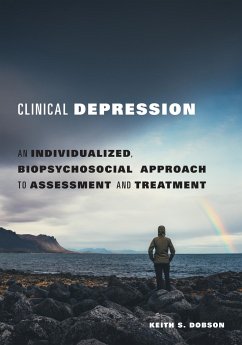Keith S. Dobson
Clinical Depression
An Individualized, Biopsychosocial Approach to Assessment and Treatment
Keith S. Dobson
Clinical Depression
An Individualized, Biopsychosocial Approach to Assessment and Treatment
- Broschiertes Buch
- Merkliste
- Auf die Merkliste
- Bewerten Bewerten
- Teilen
- Produkt teilen
- Produkterinnerung
- Produkterinnerung
This book outlines integrative models and treatments for clinical depression based on a biopsychosocial approach.
Andere Kunden interessierten sich auch für
![Behavioral Activation for Depression Behavioral Activation for Depression]() Christopher R. Martell (United States University of Massachusetts)Behavioral Activation for Depression46,99 €
Christopher R. Martell (United States University of Massachusetts)Behavioral Activation for Depression46,99 €![Rumination-Focused Cognitive-Behavioral Therapy for Depression Rumination-Focused Cognitive-Behavioral Therapy for Depression]() Edward R. Watkins (Edward R. Watkins, PhD, Director, Mood DisordersRumination-Focused Cognitive-Behavioral Therapy for Depression68,99 €
Edward R. Watkins (Edward R. Watkins, PhD, Director, Mood DisordersRumination-Focused Cognitive-Behavioral Therapy for Depression68,99 €![Mindfulness-Based Cognitive Therapy for Depression Mindfulness-Based Cognitive Therapy for Depression]() Zindel Segal (Canada University of Toronto?Scarborough)Mindfulness-Based Cognitive Therapy for Depression86,99 €
Zindel Segal (Canada University of Toronto?Scarborough)Mindfulness-Based Cognitive Therapy for Depression86,99 €![Cognitive Therapy of Depression Cognitive Therapy of Depression]() Unknown AuthorCognitive Therapy of Depression65,99 €
Unknown AuthorCognitive Therapy of Depression65,99 €![Cognitive Therapy of Depression Cognitive Therapy of Depression]() Unknown AuthorCognitive Therapy of Depression94,99 €
Unknown AuthorCognitive Therapy of Depression94,99 €![The Mindful Way Through Depression The Mindful Way Through Depression]() Mark Williams (University of Oxford (Emeritus) United Kingdom )The Mindful Way Through Depression42,99 €
Mark Williams (University of Oxford (Emeritus) United Kingdom )The Mindful Way Through Depression42,99 €![The Emperor's New Drugs The Emperor's New Drugs]() Irving KirschThe Emperor's New Drugs23,99 €
Irving KirschThe Emperor's New Drugs23,99 €-
-
-
This book outlines integrative models and treatments for clinical depression based on a biopsychosocial approach.
Hinweis: Dieser Artikel kann nur an eine deutsche Lieferadresse ausgeliefert werden.
Hinweis: Dieser Artikel kann nur an eine deutsche Lieferadresse ausgeliefert werden.
Produktdetails
- Produktdetails
- Verlag: American Psychological Association
- Seitenzahl: 291
- Erscheinungstermin: 2. April 2024
- Englisch
- Abmessung: 246mm x 170mm x 18mm
- Gewicht: 530g
- ISBN-13: 9781433836701
- ISBN-10: 143383670X
- Artikelnr.: 68540312
- Herstellerkennzeichnung
- Libri GmbH
- Europaallee 1
- 36244 Bad Hersfeld
- gpsr@libri.de
- Verlag: American Psychological Association
- Seitenzahl: 291
- Erscheinungstermin: 2. April 2024
- Englisch
- Abmessung: 246mm x 170mm x 18mm
- Gewicht: 530g
- ISBN-13: 9781433836701
- ISBN-10: 143383670X
- Artikelnr.: 68540312
- Herstellerkennzeichnung
- Libri GmbH
- Europaallee 1
- 36244 Bad Hersfeld
- gpsr@libri.de
Keith S. Dobson
Acknowledgments
Introduction: Developing Multifaceted Models and Interventions for
Depression
Part I. Understanding Depression and Its Treatment
Chapter 1. The Nature of Depression
Chapter 2. Risk and Resiliency for Depression
Chapter 3. Evolving Models of Clinical Depression
Part II. Beginning Therapy and Treatment Planning
Chapter 4. The Intake Assessment: Developing a Case-Specific Treatment
Model
Chapter 5. Optimizing Client Engagement in Treatment
Chapter 6. An Organizational Model for the Treatment of Depression
Part III. Common Strategies for Treating Depression
Chapter 7. Behavioral Activation: Addressing Risk Factors for Depression
Chapter 8. Cognitive Restructuring in the Treatment of Depression
Chapter 9. Problem-Solving Therapy Applied to Depression
Chapter 10. Modifying Core Beliefs and Schemas Associated With Depression
Part IV. Ending Treatment and Other Considerations
Chapter 11. Ending Therapy and Relapse Prevention
Chapter 12. Other Considerations in the Treatment of Depression
Part V. Future Directions in Understanding and Treating Depression
Chapter 13. The Next Steps in Evidence-Based Psychotherapy for Depression
References
Index
About the Author
Introduction: Developing Multifaceted Models and Interventions for
Depression
Part I. Understanding Depression and Its Treatment
Chapter 1. The Nature of Depression
Chapter 2. Risk and Resiliency for Depression
Chapter 3. Evolving Models of Clinical Depression
Part II. Beginning Therapy and Treatment Planning
Chapter 4. The Intake Assessment: Developing a Case-Specific Treatment
Model
Chapter 5. Optimizing Client Engagement in Treatment
Chapter 6. An Organizational Model for the Treatment of Depression
Part III. Common Strategies for Treating Depression
Chapter 7. Behavioral Activation: Addressing Risk Factors for Depression
Chapter 8. Cognitive Restructuring in the Treatment of Depression
Chapter 9. Problem-Solving Therapy Applied to Depression
Chapter 10. Modifying Core Beliefs and Schemas Associated With Depression
Part IV. Ending Treatment and Other Considerations
Chapter 11. Ending Therapy and Relapse Prevention
Chapter 12. Other Considerations in the Treatment of Depression
Part V. Future Directions in Understanding and Treating Depression
Chapter 13. The Next Steps in Evidence-Based Psychotherapy for Depression
References
Index
About the Author
Acknowledgments
Introduction: Developing Multifaceted Models and Interventions for
Depression
Part I. Understanding Depression and Its Treatment
Chapter 1. The Nature of Depression
Chapter 2. Risk and Resiliency for Depression
Chapter 3. Evolving Models of Clinical Depression
Part II. Beginning Therapy and Treatment Planning
Chapter 4. The Intake Assessment: Developing a Case-Specific Treatment
Model
Chapter 5. Optimizing Client Engagement in Treatment
Chapter 6. An Organizational Model for the Treatment of Depression
Part III. Common Strategies for Treating Depression
Chapter 7. Behavioral Activation: Addressing Risk Factors for Depression
Chapter 8. Cognitive Restructuring in the Treatment of Depression
Chapter 9. Problem-Solving Therapy Applied to Depression
Chapter 10. Modifying Core Beliefs and Schemas Associated With Depression
Part IV. Ending Treatment and Other Considerations
Chapter 11. Ending Therapy and Relapse Prevention
Chapter 12. Other Considerations in the Treatment of Depression
Part V. Future Directions in Understanding and Treating Depression
Chapter 13. The Next Steps in Evidence-Based Psychotherapy for Depression
References
Index
About the Author
Introduction: Developing Multifaceted Models and Interventions for
Depression
Part I. Understanding Depression and Its Treatment
Chapter 1. The Nature of Depression
Chapter 2. Risk and Resiliency for Depression
Chapter 3. Evolving Models of Clinical Depression
Part II. Beginning Therapy and Treatment Planning
Chapter 4. The Intake Assessment: Developing a Case-Specific Treatment
Model
Chapter 5. Optimizing Client Engagement in Treatment
Chapter 6. An Organizational Model for the Treatment of Depression
Part III. Common Strategies for Treating Depression
Chapter 7. Behavioral Activation: Addressing Risk Factors for Depression
Chapter 8. Cognitive Restructuring in the Treatment of Depression
Chapter 9. Problem-Solving Therapy Applied to Depression
Chapter 10. Modifying Core Beliefs and Schemas Associated With Depression
Part IV. Ending Treatment and Other Considerations
Chapter 11. Ending Therapy and Relapse Prevention
Chapter 12. Other Considerations in the Treatment of Depression
Part V. Future Directions in Understanding and Treating Depression
Chapter 13. The Next Steps in Evidence-Based Psychotherapy for Depression
References
Index
About the Author








